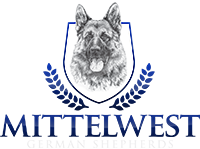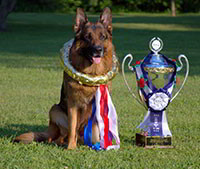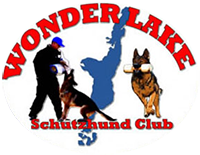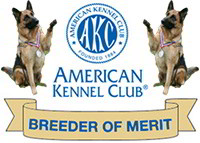TL;DR:
Training a newborn German Shepherd puppy involves early socialization, gentle handling, introducing the crate, recognizing its name, and establishing daily routines. These foundational steps, combined with positive reinforcement and consistency, set the stage for advanced training and a well-adjusted adult dog.
Bringing home a German Shepherd puppy is both exciting and life-changing. These intelligent, loyal dogs quickly become an integral part of the family. Starting training early helps them develop into calm, confident, and obedient companions.
German Shepherds thrive on structure and mental engagement. At Mittelwest, we focus on building strong foundations through early handling, socialization, and positive reinforcement, setting your puppy up for long-term success and balanced behavior.
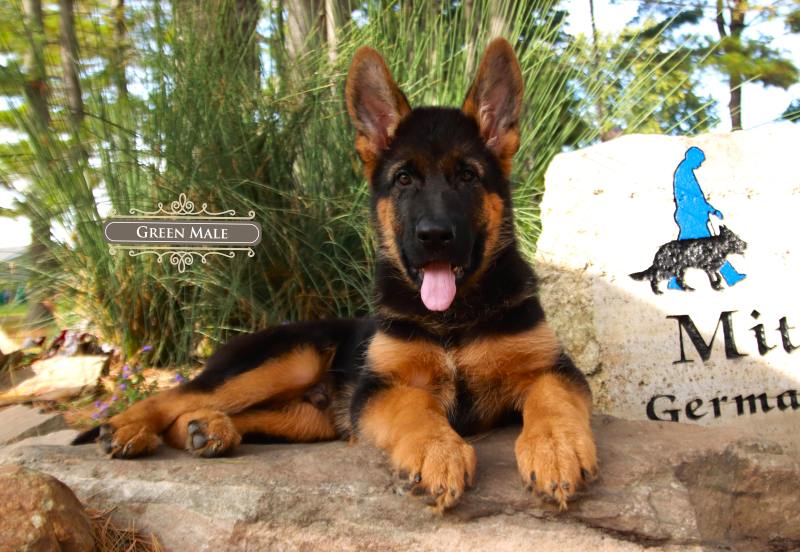
Training A Newborn German Shepherd Puppy
Training should begin as early as possible with a German Shepherd puppy, ideally from the time it is born. While puppies are still too young for formal training, you can introduce them to basic concepts and behaviors.
Early training includes socialization, handling, and positive reinforcement during their first few weeks. It sets the stage for more advanced training later on.
German Shepherds are highly intelligent, and early training can lead to quicker success when you begin teaching them basic commands, such as “stay,” “sit,” and “come.”
If you’re considering bringing home a new puppy, it’s vital to choose one that has been well-bred and properly socialized. Mittelwest German Shepherd puppies for sale focus on early socialization, making the transition to training much smoother.
Early Socialization For Your Newborn GSD Puppy
Socialization is one of the most important aspects of raising a German Shepherd puppy. Exposing them to different environments, people, and animals early ensures they become comfortable with various settings and interactions.
Early socialization helps prevent the development of fearful or aggressive behaviors later in life.
Introducing To New Experiences
- Expose your newborn German Shepherd puppy to various sounds, smells, and sights.
- Gently introduce them to different surfaces, such as carpet, tile, and grass.
- Allow them to experience household noises such as the vacuum cleaner, dishwasher, or television at a low volume.
Adjusting To Handling & Touch
It’s vital to get your newborn German Shepherd puppy accustomed to being touched and handled from a young age. It will help with grooming, vet visits, and other situations where handling is necessary.
- Gently touch your puppy’s paws, ears, and mouth to help them become accustomed to being handled.
- Make this a positive experience by giving treats and praise when they remain calm and composed.
Providing Crate Training
Crate training is a great way to create a safe and comfortable space for your newborn German Shepherd puppy. Start by slowly introducing them to the crate.
Place treats and toys inside to encourage your puppy to explore the crate independently. Never use the crate as punishment; instead, use it as a haven where they can relax and sleep.
Tip: Make the crate a positive space by providing your puppy with a blanket or soft bedding. It will help these babies associate the crate with comfort and security.
Recognizing Name
Teaching your puppy their name is an early and easy step in training. Start calling your newborn German Shepherd puppy by their name during playtime or feeding.
When they respond by looking at or coming towards you, reward them with a treat or praise. It helps your puppy learn that their name is associated with positive things.
A Routine For Your German Shepherd Puppy
Establishing a routine for your German Shepherd newborn puppy is essential for their development. A routine helps your puppy feel secure and understand what to expect throughout the day.
Set regular times for feeding, potty breaks, naps, and playtime to establish a consistent routine. A predictable schedule also makes housebreaking easier and more successful.
- Feeding: Feed your puppy on a regular schedule to promote good digestion and prevent overeating.
- Play & Exercise: German Shepherd puppies have a lot of energy, so regular playtime and exercise are necessary. However, avoid overexerting them, as their bones and joints are still developing.
- Potty Training: Begin potty training as soon as your puppy is capable of holding their bladder. Take them outside frequently and reward them when they do it outdoors.
The Need For A German Shepherd Trainer
Working with a German Shepherd trainer can also be highly beneficial. They can help with behavioral issues, teach advanced training techniques, and guide in handling any challenges that may arise during training.
Furthermore, they can also help you create a customized training plan tailored to your puppy’s temperament and needs. That’s why it’s vital to select a German Shepherd trainer with experience in the breed.
A skilled trainer will understand the unique characteristics and requirements of German Shepherds. Working with them will ensure that your puppy receives proper training, resulting in a well-behaved, balanced adult dog.
Choosing The Best German Shepherd Breeder
Finding the best German Shepherd breeder is just as important as the training process. A responsible breeder can provide you with a healthy, well-socialized puppy raised in a loving environment.
A good breeder will also start early socialization, which can make the training process much easier for you. So, before purchasing a newborn German Shepherd, ask the breeder about the puppy’s health, temperament, and early socialization practices.
A responsible breeder will ensure your puppy is ready for a new home and advise you on how to continue their training at home.
Advanced Training Techniques For GSD Puppies
As your German Shepherd puppy grows, their training needs will evolve. Building upon the foundational training established during their early weeks, you can introduce more advanced techniques to further develop their skills and behavior.
Basic Obedience Commands
Start with simple commands that are essential for good behavior and safety.
- Sit: Encourage your puppy to sit by holding a treat above their head and moving it back towards their tail. As they follow the treat, their bottom will naturally lower. Once seated, reward them with the treat and praise.
- Stay: With your puppy in a sitting position, hold your hand out in front of you and say “stay.” Take a step back, and if they remain in place, reward them. Gradually increase the distance and duration.
- Come: Crouch down to your puppy’s level and say “Come,” using their name in an enthusiastic tone. When they approach you, reward them with a treat and affection.
Leash Training
Introduce your puppy to a collar and leash early on to get them accustomed to the feeling. Begin by letting them wear the collar for short periods indoors.
Once comfortable, attach the leash and allow them to drag it around under supervision. Gradually start guiding them on short walks, rewarding calm behavior, and gentle leash tension.
Socialization With Other Dogs & People
Continued socialization is crucial as your puppy grows and develops. Arrange playdates with other vaccinated, friendly dogs to teach appropriate play behavior.
Expose them to various people, including children and adults, to build confidence and reduce fearfulness. Always supervise interactions and provide positive reinforcement for calm and friendly behavior.
Mental Stimulation & Problem-Solving
German Shepherds are highly intelligent and thrive on mental challenges. Incorporate puzzle toys, interactive games, and training sessions that require problem-solving to keep their minds engaged.
Teaching new tricks and commands regularly can also provide the mental stimulation they need.
Consistency & Patience
Consistency is key in advanced training. Ensure all family members use the same commands and reward systems to avoid confusion. Be patient, as some behaviors may take time to develop. Celebrate small victories and maintain a positive attitude to encourage continued progress.
By implementing these advanced training techniques, you will help your German Shepherd puppy mature into a well-behaved, confident, and intelligent adult dog.
Mittelwest Trains Newborn German Shepherd Puppies
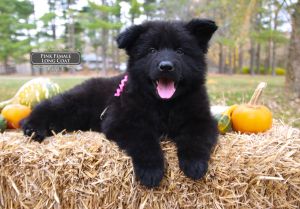 At Mittelwest, training starts the moment our puppies are born. From day one, we focus on gentle, hands-on care that introduces our German Shepherds to positive human interaction.
At Mittelwest, training starts the moment our puppies are born. From day one, we focus on gentle, hands-on care that introduces our German Shepherds to positive human interaction.
Each puppy receives early neurological stimulation to promote alertness, adaptability, and resilience. It includes soft touch, exposure to sounds, and brief, controlled changes in position to help their developing nervous systems adapt to a wide range of environments.
By weeks three to four, we begin individual handling sessions, introduce soft toys, and gradually start crate conditioning. Socialization ramps up during weeks five to eight—puppies meet new people, encounter novel objects, and participate in short, age-appropriate training games.
We use only positive reinforcement techniques. Every pup gets daily praise, encouragement, and the consistency needed to build confidence. The goal is simple: send every Mittelwest puppy home with a strong foundation for lifelong success.
At Mittelwest, our commitment to exceptional early training sets our German Shepherd puppies apart. Through proven methods and consistent nurturing, we raise puppies with confidence, curiosity, and calm focus.
Choosing a Mittelwest German Shepherd means investing in a pup that’s already begun the path to success. With our expert care and your continued training, the results speak for themselves.
